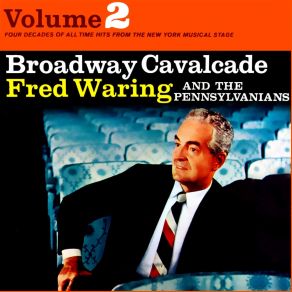Broadway Cavalcade, Vol. 2
Download links and information about Broadway Cavalcade, Vol. 2 by Fred Waring. This album was released in 2001 and it belongs to Jazz, Pop, Smooth Jazz genres. It contains 14 tracks with total duration of 45:14 minutes.

|
|
|---|---|
| Artist: | Fred Waring |
| Release date: | 2001 |
| Genre: | Jazz, Pop, Smooth Jazz |
| Tracks: | 14 |
| Duration: | 45:14 |
| Buy it NOW at: | |
| Buy on iTunes $9.99 | |
Tracks
[Edit]| No. | Title | Length |
|---|---|---|
| 1. | The Birth of Blues | 3:24 |
| 2. | April in Paris | 4:09 |
| 3. | Summertime | 3:24 |
| 4. | Old Devil Moon | 3:31 |
| 5. | Song of the Vagabonds | 2:05 |
| 6. | Fanny | 2:48 |
| 7. | Once in Love With Amy | 2:50 |
| 8. | Yours Is My Heart Alone | 4:14 |
| 9. | Hernando's Hideaway | 3:17 |
| 10. | Wagon Wheels | 2:57 |
| 11. | Stars in My Eyes | 3:19 |
| 12. | Seventy-Six Tombones | 3:09 |
| 13. | All the Things You Are | 3:21 |
| 14. | Ah! Sweet Mystery of Life | 2:46 |
Details
[Edit]The T.O.M. label presents the second of two volumes devoted to Fred Waring's Pennsylvanians. These 24 Victor recordings, made between January 1929 and November 1932, illustrate how this band had traded in most of its earlier collegiate identity for slicker presentation techniques and a repertoire more worthy of the Broadway working environment in which they operated after 1928. The Pennsylvanians often used remarkably complex charts and stunningly inventive vocal arrangements; during their "Broadway" period the band's sound became downright swanky. Quoted in Dizzy Gillespie's autobiography To Be or Not to Bop, saxophonist and arranger Budd Johnson insisted that Fred Waring succeeded during the late '20s and early '30s at least partly thanks to the ingenuity of Afro-American arrangers; this information was never officially documented let alone voiced by Waring, but the jazz-like elements that made the band so terrifically exciting certainly didn't originate in rural Pennsylvania. Paul Mertz is credited with having devised many of their most exciting arrangements, but who else sold charts to Waring? Nobody knows. The vocal stars of this particular album are the three Waring Girls, also known as the "Three Girl Friends." They harmonize like a flock of Nereids during Irving Berlin's "Let Me Sing and I'm Happy," Cole Porter's notorious "Love for Sale" and Vincent Youmans' "Tea for Two," which ends with a flashy flourish after the band suddenly begins to accelerate as if trying to finish the song before the record runs out. After 1932, this group stopped making phonograph records and concentrated on broadcasting live over the radio rather than performing for posterity in the recording studio. Waring, like Irving Berlin a few years earlier and the R.I.A.A. at the beginning of the 21st century, saw technological dissemination of pre-recorded music as a threat rather than a promotional tool; he is said to have deliberately ceased producing records after it occurred to him that the Depression Era audience was hearing his music over the air for nothing rather than investing in the numerous titles listed under his group's name in the Victor catalog. Sadly, most of the records this group cut between 1923 and 1932 would soon fade from memory and are still languishing in obscurity. During the second half of the '30s, Fred Waring became obsessed with the perfection and promotion of the Waring blender. By the time he started making records again, he opted for the sifted, refined, enriched glee club formula with which the name Waring's Pennsylvanians has since been linked.